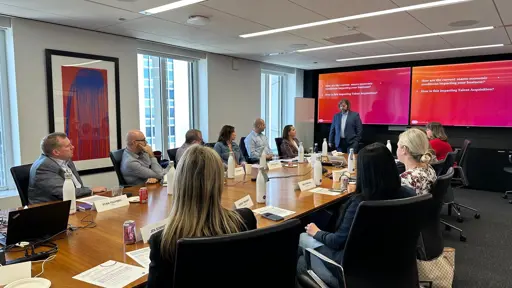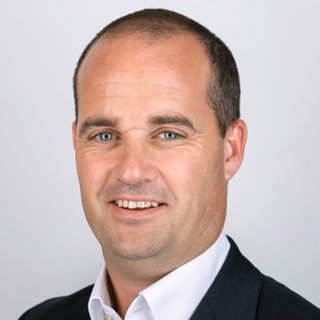Organisations around the world are facing a dual challenge: how to meet shifting employee expectations while staying at the forefront of innovation, particularly with generative AI. At our London roundtable, industry leaders dove into these key topics, DEI, and more to discuss how they’re shaping the future of talent acquisition (TA).
Here we share actionable insights to help TA leaders navigate today’s workforce complexities.
The economic context
AlixPartners’ 2024 Disruption Index
Drawing from the latest AlixPartners Disruption Index, we explored the macroeconomic factors shaping HR and TA trends and strategies. This year’s report emphasised a growing sense of urgency among CEOs, with their biggest concerns focused on:
Macro environments
- 41% report that inflation and interest rates are a threat
Geopolitical tensions
- 66% of CEOs worry about the impact of the 2024 U.S. presidential election on their business
- 68% report U.S.-China tensions are causing them to adjust their strategy
Climate change
- 68% feel pressure from the government to take a stand on environmental issues
- 57% feel that same pressure from employees
Tech innovation
- 67% view GenAI as the biggest disruptive opportunity
In this economic environment, understanding internal capabilities is critical. A survey taken at the roundtable uncovered gaps between the importance organisations place on key HR and TA priorities and their ability to deliver. Diversity, equity & inclusion (DEI), early talent programs, and AI strategy development were the greatest challenge areas.
Key skills for future success were also identified, with technological proficiency standing out. These are essential for organisations striving to stay competitive and agile in the evolving work landscape. A detailed breakdown of these skills is provided in the image below.
AI adoption challenges in talent acquisition
Generative AI presents a significant opportunity in talent acquisition. But many organisations struggle to keep pace with its rapid evolution – with 63% of executives overwhelmed by the rate of change, according to Alix Partners. Matt Jones, Chief Product Officer at Cielo, highlighted how AI is transforming HR processes. With proactive organisations leveraging data-driven insights to navigate these turbulent waters and foster a culture that embraces agility and innovation.
A key theme was understanding the benefits and risks of AI adoption. While many leaders recognise AI’s potential, effectively communicating its value remains a hurdle. Leaders may fear risks, such as data privacy concerns or overreliance on technology, yet the greater risk might be falling behind competitors who quickly embrace AI.
Regulatory considerations were also discussed, underscoring the importance of understanding the legal landscape. AI legislation is set to come into force between 2025 and 2026, including the EU AI Act and Biden’s Executive Order. This makes it an ideal time for companies to conduct an AI audit to ensure compliance and readiness. As seen with GDPR, such regulations don’t stifle innovation – they make organisations more accountable and responsible. Greater governance will encourage responsible AI adoption, with several frameworks at the forefront of these changes:
- NIST Framework: Crucial for underpinning Biden’s Executive Order, which will heavily impact AI governance in the United States.
- EU AI Act: Leading the way in ensuring responsible AI practices across Europe.
- ISO/IEC 42001: An essential AI-specific certification for organisations seeking to demonstrate compliance and trustworthiness.
In a conversation around adoption challenges in HR, attendees discussed scepticism surrounding AI's role in recruitment and concerns about the reliability of online assessments, where candidates might use AI to navigate tests. The disconnect between human and machine judgment emerged as a central challenge, as AI is often held to a higher standard than human decision-making, causing reluctance to lose the human element in recruitment.
Feedback suggested viewing AI as an enabler that supports decision-making rather than replacing it. This approach fosters collective agreement on AI's role, ensuring alignment between leadership and employees. The group concluded that successfully integrating AI into HR requires a culture of collaboration and understanding. By embracing AI’s benefits and acknowledging its limitations, organisations can effectively navigate the evolving landscape of talent acquisition.
Is workforce planning still viable?
In an age of rapid change and uncertainty, the viability of workforce planning has become a hotly debated topic. During our panel discussion, industry leaders explored how talent acquisition can rebuild capabilities and adapt to an evolving business landscape.
A major challenge is the rise of hybrid roles, which disrupt traditional forecasting models. Wayne Palmer, HR & Talent Director at Britvic, highlighted the importance of internal mobility, noting that many organisations “know more about their customers than their own employees,” which limits effective workforce planning. Tracking employee skills and understanding their motivations is critical for informed talent development and succession planning. With the right preparation, organisations can successfully embrace flexible work arrangements to meet candidates where they are.
Mike Clements, Recruitment Director EMEA at NVIDIA, discussed the challenge of high applicant volumes but low conversion rates, with fewer than 1% of applicants being hired. He stressed the importance of candidate experience, supported by technology, to enhance communication and make applicants feel valued – even those not hired. For him, workforce planning is about attracting the right talent in a competitive market, not just filling roles.
Sonia Mooney, HR Transformation Consultant, believes that workforce planning is more essential than ever, as it aligns talent acquisition trends with long-term business goals. She stressed that it’s not just an HR issue but a strategic business imperative.
Sally Hunter, Executive Vice President – Revenue Strategy at Cielo, raised the critical issue of HR's visibility in business strategy, highlighting the need for HR leaders to be able to contribute to strategy development from the outset.
Palmer and Clements emphasised that organisations need to understand their current workforce's skills and capabilities. This is essential, not just for immediate recruitment needs, but for future-proofing talent pipelines, enabling career growth and ensuring employees can transition into new roles as business needs change.
The panel reinforced that workforce planning is not obsolete–but it’s evolving. Organisations must align workforce planning with broader business goals, leverage technology to improve candidate experiences, and harness internal mobility to build stronger, adaptable teams for the future.
Looking forward
Talent acquisition and HR are facing significant challenges – but there are unique opportunities for growth and innovation. Prioritising employee insights, embracing technological advancements like AI, and fostering adaptability will help organisations position themselves for long-term success.
CieloWe need to work together, across enterprises, countries and regions to solve how we leverage AI.
As Sally Hunter, Executive Vice President – Revenue Strategy at Cielo, aptly noted: “We need to work together, across enterprises, countries, and regions to solve how we leverage AI. The more we can be in the room together, with intellectual generosity a given, the more we can effectively leverage innovation.”
By fostering collaboration and forward-thinking strategies, businesses can navigate today’s complexities and build a future-ready workforce.

Trends in talent acquisition: Takeaways from Cielos global TA roundtable series
Read nowAbout the experts

Executive Vice President – Product, Cielo
LinkedIn connect
Executive Vice President – Revenue Strategy, Cielo
LinkedIn connect
HR Transformation Consultant, Sonia Mooney Signature Solutions
LinkedIn connect
HR & Talent Director, Britvic
LinkedIn connect
Recruitment Director EMEA, NVIDIA
LinkedIn connect








